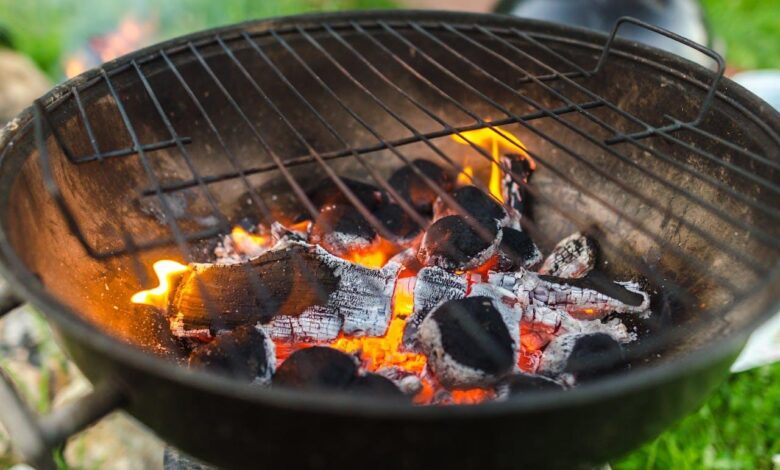Charcoal Briquettes or Lumpwood Charcoal? Pros, Cons and More

When it comes to charcoal barbecues, the type of fuel you choose can make a difference. It’s the foundation of every flame, every sear, and every smoky bite. But when you’re staring down the barbecue aisle, the choice often comes down to two options: charcoal briquettes or lumpwood charcoal.
Both will fire up your grill. But they behave differently, taste different, and work better in different scenarios.
What’s the Difference Between Charcoal Briquettes and Lumpwood?
Charcoal briquettes are machine-made. They’re created by compressing powdered charcoal with additives—like starch (as a binder), limestone (as a filler), and sometimes chemical accelerants to help with lighting.
On the other hand, lumpwood charcoal is more natural. It’s made by slowly burning hardwood in a low-oxygen environment until only carbon remains. No shaping. No additives. Just chunks of carbonised wood.
So, while they’re both used in charcoal barbecues, their performance and characteristics are different.
Pros of Charcoal Briquettes
Long, Steady Burn
Charcoal briquettes are known for their consistency. Once lit, they burn longer and more evenly than lumpwood. That makes them perfect for low and slow cooking—like ribs, brisket, or pulled pork.
Reliable Heat
Their uniform size means predictable heat output. This is especially helpful if you’re new to charcoal barbecues and want stable cooking temperatures without constant fire tending.
Affordable and Widely Available
You’ll find charcoal briquettes in nearly every supermarket or garden centre. And they’re often cheaper than lumpwood, which makes them a budget-friendly option for frequent grillers.
Cons of Charcoal Briquettes
Chemical Additives
Some briquettes contain synthetic binders or lighter fluids. These can affect the taste of your food—especially if you don’t let them burn down properly before cooking.
Slower to Light
Without the help of chemical starters, briquettes take longer to catch fire. You’ll need a chimney starter or lighter cubes to get going efficiently.
More Ash Production
Briquettes tend to leave behind more ash than lumpwood, so you’ll spend more time cleaning up after a cookout.
Pros of Lumpwood Charcoal
100% Natural
No chemicals. No binders. Just real wood. This means lumpwood burns cleanly and gives you that unmistakable, authentic barbecue flavour.
Burns Hotter
Need serious heat for a steak? Lumpwood is your friend. It burns hotter than charcoal briquettes, making it ideal for searing meat and quick, high-heat cooking.
Less Ash
Because there are no fillers, you’ll deal with far less ash buildup in your grill. That means less mess and better airflow during your cook.
Cons of Lumpwood Charcoal
Burns Faster
Yes, lumpwood gives you intense heat—but it doesn’t last as long. You may find yourself refuelling partway through a longer cook.
Inconsistent Size and Shape
Each bag of lumpwood is different. Some chunks are large, others are tiny. This irregularity can lead to uneven heat unless you take time to arrange your fire carefully.
Requires More Fire Management
Because of its unpredictability, lumpwood needs more attention. You’ll have to keep a closer eye on temperature fluctuations during your cook.
When to Use Each Type
Choose Charcoal Briquettes when:
· You’re cooking something low and slow (like pork shoulder or whole chickens)
· You want consistent heat without babysitting the fire
· You’re just starting out and want a forgiving fuel source
· You need a long burn time without frequent refuelling
Choose Lumpwood Charcoal when:
· You’re doing a quick cook like burgers, kebabs, or steaks
· You want a natural smoky flavour with no additives
· You’re comfortable adjusting your heat manually
· You’re grilling at high temperatures or searing over direct heat
Some people even mix both in their charcoal barbecues—using lumpwood for the initial sear, then switching to briquettes for the long haul. It’s a smart way to get the best of both worlds.
Eco-Friendly Considerations
No matter which type of charcoal you prefer, you can still make greener choices.
Some charcoal briquettes are now made with sustainable materials like coconut shells, bamboo, or reclaimed wood. These eco-friendly briquettes produce less smoke and reduce pressure on forests.
For lumpwood, look for FSC-certified options. This means the wood comes from responsibly managed forests. Avoid imported lumpwood from unknown sources, which may contribute to illegal deforestation.
Final Thoughts
There’s no single right answer. It all depends on your grill setup, cooking style, and flavour preferences.
If you want a long-lasting, even heat for all-day smoking, briquettes are a solid choice. If you love fast, fiery cooks and that rich, natural smoke flavour, go with lumpwood.
And if you’re serious about your charcoal barbecues, why not keep both on hand? That way, you’ll always have the perfect fuel for the job.



